|
|
|
Sort Order |
|
|
|
Items / Page
|
|
|
|
|
|
|
| Srl | Item |
| 1 |
ID:
096501
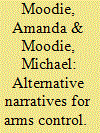

|
|
|
|
|
| Publication |
2010.
|
| Summary/Abstract |
The efforts of President Barack Obama and his administration to restore the United States as a driving force of multilateral arms control and nonproliferation negotiations are commendable, yet the lack of progress on such issues over the last eight years has ensured that U.S. policy has not kept pace with changes in the geostrategic environment and the evolving security agenda. Meanwhile, an alternative agenda has been articulated by non-Western countries. This article focuses on the arms control perspectives of Non-Aligned Movement states and others that have begun to embrace the idea of "disarmament as humanitarian action." It explores this idea in the context of recent initiatives and argues that if the Obama administration wants to make progress on its arms control and nonproliferation priorities, it should consider a multifaceted approach that incorporates this emerging alternative agenda.
|
|
|
|
|
|
|
|
|
|
|
|
|
|
|
|
| 2 |
ID:
173918
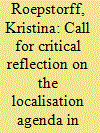

|
|
|
|
|
| Summary/Abstract |
Calls for a greater inclusion of local actors have featured for some time in debates on how to make humanitarian action more efficient and address unequal power relations within the humanitarian system. Though the localisation agenda is at the core of current reform efforts in the humanitarian sector, the debate lacks a critical discussion of underlying assumptions – most strikingly, the very conceptualisation of the local itself. It is argued that the current discourse is dominated by a problematic conceptualisation of the local in binary opposition to the international, leading to blind spots in the analysis of exclusionary practices of the humanitarian sector. As such the localisation agenda risks perpetuating the very issues it wants to redress. A critical localism is thus proposed as a framework for much needed research on the localisation agenda.
|
|
|
|
|
|
|
|
|
|
|
|
|
|
|
|
| 3 |
ID:
190742
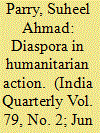

|
|
|
|
|
| Summary/Abstract |
Humanitarian action is commonly thought to involve two types of aid providers: international and local actors. But this tends to ignore a third humanitarian domain, namely transnational humanitarianism during conflicts, global epidemics and natural disasters by diaspora individuals and organisations. These transnational connections, which involve the mobility of people, goods and money, significantly change the context in which global humanitarian actors function and may have notable secondary effects on other aid providers. We contend that the significance of diaspora humanitarianism during natural disasters and the COVID-19 pandemic has still not been thoroughly explored in the academic literature and remains relatively ‘invisible’ in aid practices and policies. This article arises from an empirical study on the significance of diaspora in humanitarian action by analysing the impact of diaspora remittances and organisations that have emerged as an important potential for diasporas during humanitarian action. To examine the potential and role of the diaspora in humanitarian action, this article makes the case for the Indian diaspora’s humanitarian potential and efforts, particularly during the COVID-19 pandemic in India.
|
|
|
|
|
|
|
|
|
|
|
|
|
|
|
|
| 4 |
ID:
072899
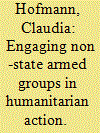

|
|
|
|
|
| Publication |
2006.
|
| Summary/Abstract |
Formal actors are faced with vast shortcomings in articulating a legal foundation for engaging non-state armed groups. This essay addresses the difficulties, differences and commonalities for state and non-state actors in engaging with non-state armed groups. It demonstrates how non-governmental organizations offer the potential to fill the gap in the international legal regime by employing lower-key initiatives that avoid political issues such as the legitimization or recognition of non-state armed groups. The essay concludes that 'small agreements' in the humanitarian field bear the capacity to contribute enormously to prospective peace processes.
|
|
|
|
|
|
|
|
|
|
|
|
|
|
|
|
| 5 |
ID:
123529
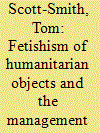

|
|
|
|
|
| Publication |
2013.
|
| Summary/Abstract |
This paper examines two common objects in humanitarian assistance: a therapeutic food called Plumpy'nut, and a tape for measuring malnutrition known as the muac band. It argues that humanitarian relief has become a standardised package reliant on such objects, which receive excessive commitment from aid workers and are ascribed with almost magical powers. Drawing on the Marxist notion of commodity fetishism, the paper proposes a three-part model for examining this phenomenon, in which humanitarian objects are bound up in processes of concealment, transformation and mystification. First, these objects are perceived as rootless, recent discoveries, allowing the complex history and ambivalent results of technology to be concealed. Second, they facilitate a single-minded attention to efficiency and aggregate survival, which transforms the way humanitarian action is understood. Third, these objects are imbued with a mystical and autonomous spirit, redefined as irreplaceable elements of aid. This 'fetishism of humanitarian objects', the paper concludes, prevents a more flexible and people-centred approach to relief.
|
|
|
|
|
|
|
|
|
|
|
|
|
|
|
|
| 6 |
ID:
113106
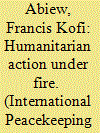

|
|
|
|
|
| Publication |
2012.
|
| Summary/Abstract |
The spate of attacks against humanitarian NGOs since 2003 has raised a series of fundamental questions for humanitarian operations in Iraq, Afghanistan and other conflict and post-conflict situations. This article reflects on the 'new humanitarianism' and how increasingly, this humanitarianism is under attack in violation of the Geneva Conventions on the Laws and Customs of War. It argues that humanitarian action is under attack because of efforts by Western governments (particularly the United States) to make humanitarian NGOs an extension of their military and political agendas. In circumstances of the politicization of humanitarian aid, it becomes difficult for combatants to distinguish between Western governments' agendas and those of NGOs. The article concludes by calling for the insulation of humanitarian aid from politics. This separation of politics and humanitarianism can only be realized by returning to traditional principles that have guided humanitarian action.
|
|
|
|
|
|
|
|
|
|
|
|
|
|
|
|
| 7 |
ID:
119431
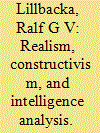

|
|
|
|
|
| Publication |
2013.
|
| Summary/Abstract |
The current rapid expansion of Intelligence Studies 1 is being driven by an increased need for intelligence in an unpredictable post-post Cold War world 2 that features complex operational contexts requiring special expertise, 3 private contractors increasingly performing core intelligence functions, 4 and intelligence missions expanding into completely new fields such as humanitarian action. 5 These trends, unlikely to be reversed in the immediate future, create a demand for the academic training of personnel in growing and diversifying intelligence communities. This will in turn generate an inherent pressure to further establish Intelligence Studies as a separate academic discipline. Not surprisingly, the hitherto fruitless search for a "theory of intelligence" has been rekindled. 6 Considering developments in adjacent disciplines, epistemological issues will, in all likelihood, increasingly come into focus. 7 Among them: What is "knowledge" in intelligence, and what counts as "true" or "justified" knowledge, if any?
|
|
|
|
|
|
|
|
|
|
|
|
|
|
|
|
| 8 |
ID:
152990
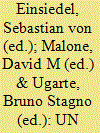

|
|
|
|
|
| Publication |
New Delhi, Viva Books, 2017.
|
| Description |
xv, 999p.hbk
|
| Standard Number |
9789386385277
|
|
|
|
|
|
|
|
|
|
|
|
Copies: C:1/I:0,R:0,Q:0
Circulation
| Accession# | Call# | Current Location | Status | Policy | Location |
| 059072 | 341.23/EIN 059072 | Main | On Shelf | General | |
|
|
|
|
|
|
|
|
|